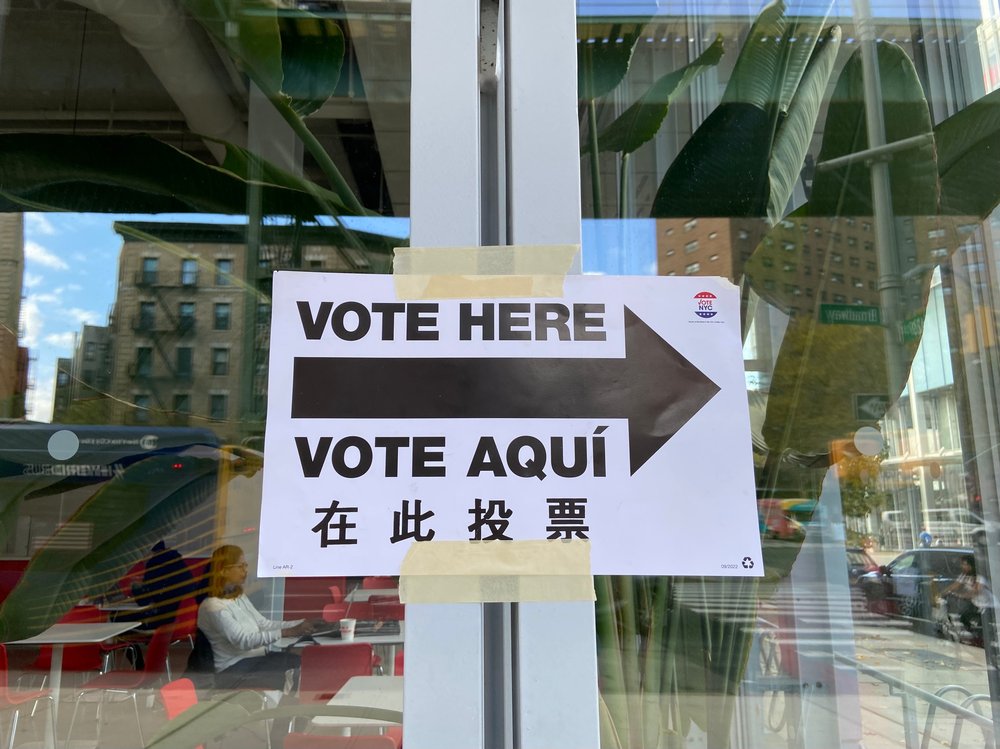'We stand ready to fight' — Appellate Court hears arguments over NYC noncitizen voting law
June 23, 2023, 4:46 p.m.
Attorneys for the city and intervenors defended the law while opponents challenged its legality.

Supporters of a year-old law aimed at expanding voting rights to nearly a million immigrants in New York City took their case to the Appellate Court in Brooklyn Friday, seeking to overturn a lower court ruling that barred the law from taking effect.
At issue is Local Law 11, which is known by advocates as “Our City, Our Vote” and would allow non-U.S. citizens who have work permits or are legal permanent residents or green card holders to vote in elections for city offices. That includes the elections for the City Council or for the offices of borough president, city comptroller, public advocate and mayor.
The law passed the City Council in December 2021, and was enacted shortly after Mayor Eric Adams took office in January 2022. The very next day, a group of Republican lawmakers led by Staten Island Borough President Vito Fosella filed a lawsuit in state court in Richmond County calling the law unconstitutional.
In that case, Justice Ralph Porzio sided with the plaintiffs, ruling that the city’s law violated the language of the state constitution, which refers to voting rights in the context of “citizens.” He also ruled the law violated state election law and the state municipal home rule law, agreeing with the plaintiffs' argument that the new influx of municipal voters would dilute the weight of voters who are citizens.
The city's Law Department and a group of advocates for immigrants' rights filed an appeal on behalf of the Adams administration and a group of eight intervening defendants whose voting rights would be directly affected by the outcome of the case.
On Friday, a panel of four judges from the Appellate Division's second department heard arguments for more than an hour from attorneys on both sides of the lower court’s decision. Their ruling in the case is not expected until fall.
Attorney MacKenzie Fillow, who appeared on behalf of the city, said the Appellate Division should reverse the lower court’s decision because the plaintiffs did not meet their “heavy burden” of proving the law was unconstitutional. She said the state constitution does not prevent the city from setting rules that govern its local elections.
“This law will impact New York City only. People on Long Island will not be impacted by this. People upstate will not be impacted by this,” said Fillow. She said this law will empower city residents when it comes to speaking to their local representatives, “to complain about garbage, to complain about the police, to complain about zoning, to complain about whatever they want to complain about.”
She argued the law was about making sure public officials feel accountable to all tax-paying residents.
Fulvia Vargas de Leon, senior counsel for LatinoJustice PRLDEF, also asked the panel to overturn the lower court’s decision. She added that the state constitution sets the floor when it comes to voter qualifications, but does not prohibit localities from adding to the list as part of their self-governance.
Attorney Michael Hawrylchak appeared on behalf of the plaintiffs, asking the panel to uphold the lower court decision. He reiterated the lower court’s opinion that the law should be blocked on constitutional grounds. He also urged the court to take decisive action and not to dismiss the case without weighing in on the legal questions it raises.
He said if the law was to take effect, it would likely be challenged again after an election.
“The worst possible time to resolve a dispute about election qualification criteria is after the election has already happened,” said Hawrylchak. “And that’s virtually guaranteed if this court does not decide it now.”
The attorneys made their case before Justices Paul Wooten and Lillian Wan of Kings County, and Angela Iannaci and Helen Voutsinas of Nassau County.
Before the court convened on Friday, advocates held a press conference outside the courthouse in Brooklyn with representatives from immigrant and voting rights organizations.
“For too long democracy has been deferred, and this delay has cost our community the chance to participate in the first election,” said Cesar Ruiz, an attorney with LatinoJustice PRLDEF, which intervened in the case on behalf of eight individuals who live and work in the city and would be granted voting rights under this law.
If the law had taken effect as written, eligible voters would have been able to register under a new “municipal voter” category with the New York City Board of Elections and participate in the current City Council primary elections.
As of Thursday, fewer than 30,000 of an estimated 2.5 million eligible voters cast ballots in this primary. The next municipal election is not scheduled until 2025.
Susan Stamler, the executive director of United Neighborhood Houses and a leading advocate for this law, stressed the importance of noncitizens who perform essential work also having a say in electing the representatives that create policies that affect their lives directly. She also noted that other localities across the country have begun adopting similar measures.
Correction: A previous version of this story misspelled Susan Stamler's name and misstated the organization name, United Neighborhood Houses.